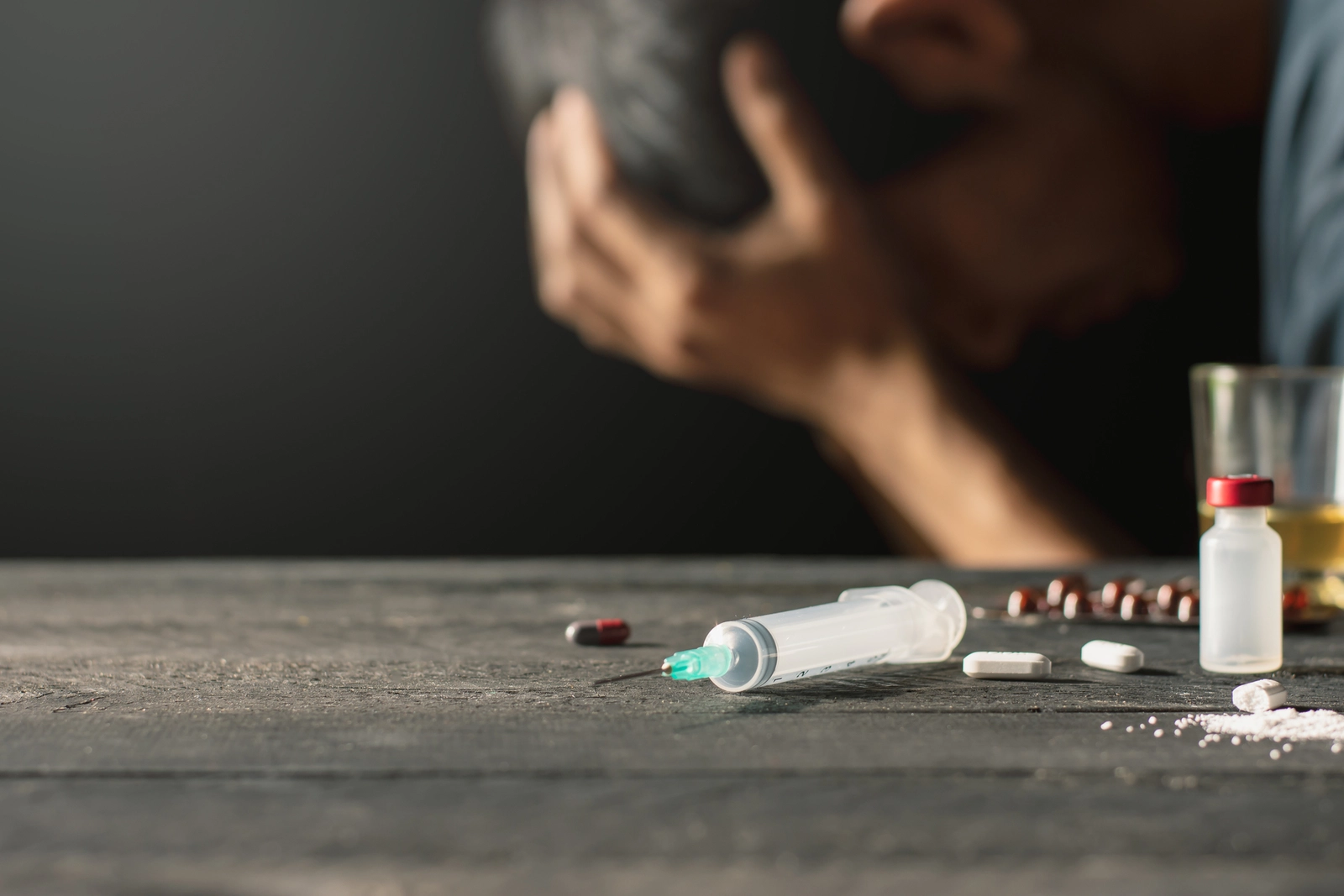Addiction | 6 min read
What Is Addiction and Am I An Addict?
Medically Reviewed By

On August 30, 2022
Written By
On August 28, 2020

When you’re in the throes of substance abuse, it can be hard to spot a growing addiction problem. Friends and loved ones can see it. If you’re wondering “what is addiction,” there’s a good chance you’re starting to see it, too. Addiction develops in stages that can be easy to miss, especially when drug or alcohol cravings start vying for your attention. Asking yourself, “Am I an addict?” may well be the first step towards seeing the problem.
What Is Addiction?
Addiction is a chronic, relapsing disorder that involves compulsive drug or alcohol use despite harmful consequences.[1] While addiction may begin with the physical effects of substances, it’s driven by psychological and behavioral changes that disrupt how you think, feel, and function. These changes are due to the brain’s reward system and dopamine, which is influenced by drugs.
Why Am I Easily Addicted to Things?
Some people may be more susceptible to addiction due to genetics, past trauma, co-occurring mental health disorders, or environmental factors.[2] If you’re wondering, “Why am I easily addicted to things?” or “Am I addicted to drugs?” remember that it’s not a weakness or moral failing – it’s a chronic disease.
Stages Leading to Addiction
While it’s possible to get addicted to certain drugs the first time you use them, addiction typically develops over time as the effects of the drug disrupt the brain’s chemical system. With the most commonly abused drugs (heroin, cocaine, prescription pain pills), the “high” experience stems from a massive dopamine release in the brain. Dopamine is a primary neurotransmitter chemical that regulates critical functions throughout the brain and body, including:[3]
- Motor control or movement
- Feelings of pleasure
- Learning
- Sleep
- Mood
- Pain perception
- Attention
- Reward-motivated behavior
In effect, the answer to the question, “What is addiction?” starts with dopamine. With repeated drug (or alcohol) abuse, dopamine levels become imbalanced. This causes the brain to become increasingly dependent on the drug’s effects to produce the amount of dopamine your body needs to function normally.
Over time, these developments set off a series of changes that led straight to addiction’s door:
Increasing Tolerance Levels
Tolerance levels have to do with the brain’s sensitivity to a drug. With addictive drugs, the brain cells that produce dopamine become less and less sensitive to the drug’s effects.[3] This means you have to keep taking larger doses to experience the “high” effects of the drug. This development causes a person to take increasingly larger or more frequent doses, or both.
Withdrawal Effects
As tolerance levels increase, the affected brain cells become less effective in producing the necessary dopamine levels. When you start experiencing withdrawal effects, physical dependence on the drug’s effects has taken hold. Withdrawal effects reflect the state of chemical imbalance in the brain caused by the ongoing impact of the drug. These effects may take the form of:[4]
- Fatigue
- Irritability
- Headaches
- Flu-like symptoms
- Mood swings
- Agitation
- Confused thinking
Many try to gain relief from withdrawal by taking more of the drug, which helps for a while but only worsens the next round of withdrawal. In effect, increasing tolerance levels and withdrawal form a vicious cycle that keeps you using the drug. At this point, the question, “Am I an addict?” may start to rear its ugly head.
Addiction
The definition of addiction wouldn’t be complete without discussing how addiction forms within the brain’s chemical system. And it begins and ends with dopamine.
Dopamine’s role in regulating reward-motivated behavior lies at the root of a growing addiction.
Under normal, drug-free conditions, dopamine levels increase whenever you engage in something that makes you feel good. An area of the brain known as the reward system tracks dopamine levels to determine which behaviors bring about positive results on any given day. Positive results may include:
- The feeling you get after eating a good meal
- Feelings of accomplishment after meeting a goal
- Sexual pleasure
- Feeling refreshed after having a cool drink on a hot day
From the brain’s perspective, the “high” experience you get from using an addictive drug is also positive. When a positive result happens repeatedly, your brain’s reward system hardwires this behavior into your daily routine.[5] This means getting and using drugs becomes a need, much like the body’s need for food, water, and sex.
Do I Have an Addiction Quiz: Self-Assessment Tool
Wondering if your substance use has crossed into addiction? This short quiz, based on the criteria in the Diagnostic and Statistical Manual of Mental Disorders (DSM-5), can help you reflect on your behaviors and determine if you need to seek a formal assessment and professional help.[6]
Drug Addiction Quiz: Am I Addicted to Drugs?
Answer “yes” or “no” to the following:
- Do you often use more of a substance than you originally intended?
- Have you tried and failed to cut back on drug use?
- Do you spend a lot of time thinking about, obtaining, or recovering from substance use?
- Has your substance use interfered with work, school, or relationships?
- Do you continue using substances even when they cause physical or emotional problems?
- Have you lost interest in hobbies or activities that you once enjoyed?
- Do you use substances to cope with stress, anxiety, or depression?
- Have others expressed concern about your substance use?
- Do you feel withdrawal symptoms when you’re not using?
- Do you hide or lie about your substance use?
Scoring:
- 0-2 “Yes” answers: You may be experimenting with drugs, but addiction may not be present yet. It’s essential to monitor your behavior.
- 3-5 “Yes” answers: You may be developing a substance use problem. Consider talking to a professional about your substance use for more clarity.
- 6+ “Yes” answers: These are strong indicators of addiction. Seeking help from a qualified addiction treatment center is strongly recommended.
Keep in mind that this quiz is only an informational tool to help you self-assess your substance use and choose to seek help. A formal assessment is necessary to diagnose a substance use disorder.
What If I’m Not Sure I Have a Problem?
If you’re still wondering, “Do I have an addiction?” or you’re not sure even after taking the quiz, that’s normal. Many people are hesitant to label their substance use as an addiction, especially if they haven’t experienced consequences or disruption in their day-to-day lives.
This is sometimes referred to as “pre-addiction.”[7] You may feel like you’re in control, and look that way to others, but your substance use is already causing problems with your mental health, relationships, or personal goals.
Do you feel uncomfortable with how much or how often you use a substance? Are you hiding it or lying to loved ones? Do you rely on substances to escape, cope, or just feel normal? Have you lost anything due to substance use, like money, time, or opportunities in your professional or personal life?
If you answered “yes” to any of these, or they make you think a little harder about your substance use patterns, it’s worth taking your concerns seriously. The earlier you seek help, the better the outcome.
Am I an Addict? Signs to Watch for
More than anything else, signs of addiction will appear in your behaviors and choices.[8] As addiction takes hold, your life starts to revolve around getting and using drugs (or alcohol). What was once casual drug use turns into a compulsive habit where cravings for more of the drug dictate your comings and goings. Before long, getting the next “fix” will become so crucial that you’re willing to place anything and everything at risk, including your job, relationships, and self-respect.
- Emotional Signs of Addiction
- Anger
- Defensiveness
- Extreme mood swings
- Making excuses for drug-using behaviors
- Blaming others for your shortcomings
- Denying you have a problem
- Minimizing your drug problem and the negative consequences it creates
- Behavioral Signs of Addiction
- Isolating from friends and family
- Missing days at work or school
- Relationship conflicts
- Money problems
- Problems sleeping
- Problems with the law, such as DUIs
- Change in a social group (spending more time with other drug users)
- Loss of interest in activities you once enjoyed, such as spending time with family or a hobby
Things to Keep in Mind
If you see yourself or someone you know in the above descriptions, know that an addiction problem doesn’t go away on its own. Addiction will continue to get worse as long as substance abuse continues. Also, know that if you want to stop, you don’t have to do it alone.
Detox and addiction treatment programs provide the level of support you need to break addiction’s hold on your life. Like addiction, recovery happens in stages, but nothing happens until you take that first step.
If you’re struggling with a drug or alcohol problem and seeking substance abuse programs in New Jersey or New York, contact Ascendant today. It will be the most critical step you can take at this point in your life. Our New York alcohol detox and treatment program can help you regain control of your life and begin your recovery journey with fresh hope and support.
Frequently Asked Questions About Addiction
No, an “Am I an Addict?” quiz is not a diagnostic tool, but it can help you identify warning signs of substance use disorder. If your quiz results raise concerns or make you question your substance use, it’s best to speak to a professional in mental health or addiction.
If you score in the high-risk category, it’s essential to reach out to an addiction treatment center or another mental health professional. Getting a formal evaluation and guidance can help you understand if you have an addiction, what treatment options are available, and what your next steps should be.
Yes. Addiction can be mostly psychological, especially early on in your substance use history. Cravings, emotional dependence, and compulsive behaviors can occur even without intense physical withdrawal symptoms.
If you can’t control your substance use, want to stop or cut back but can’t, or begin to experience problems in your work, health, or family life, you may be addicted. Taking the self-assessment can help you better understand your substance use patterns and seek help if needed.
Yes, some people are more likely to become addicted to substances. Genetics, mental health conditions, trauma history, and environmental influences can make you more vulnerable to addiction.
Ascendant New York Editorial Guidelines
Here at Ascendant New York, we understand the importance of having access to accurate medical information you can trust, especially when you or a loved one is suffering from addiction. Find out more on our policy.
[1] U.S. Department of Health and Human Services. (2025a, January 30). Drug misuse and addiction. National Institutes of Health. https://nida.nih.gov/publications/drugs-brains-behavior-science-addiction/drug-misuse-addiction
[2] Alhammad, M., Aljedani, R., Alsaleh, M., Atyia, N., Alsmakh, M., Alfaraj, A., Alkhunaizi, A., Alwabari, J., & Alzaidi, M. (2022, December 8). Family, individual, and other risk factors contributing to the risk of substance abuse in young adults: A narrative review. Cureus. https://pmc.ncbi.nlm.nih.gov/articles/PMC9731175/
[3,4,5] Substance Abuse and Mental Health Services Administration (US). (n.d.). The Neurobiology of Substance Use, misuse, and addiction. Facing Addiction in America: The Surgeon General’s Report on Alcohol, Drugs, and Health [Internet]. https://www.ncbi.nlm.nih.gov/books/NBK424849/
[6] What is a substance use disorder?. Psychiatry.org – What Is a Substance Use Disorder? (n.d.-a). https://www.psychiatry.org/patients-families/addiction-substance-use-disorders/what-is-a-substance-use-disorder
[7] U.S. Department of Health and Human Services. (2023, March 3). Time to start talking about pre-addiction. National Institutes of Health. https://nida.nih.gov/about-nida/noras-blog/2022/07/time-to-start-talking-about-pre-addiction
[8] Mayo Foundation for Medical Education and Research. (2025, June 20). Drug addiction (substance use disorder). Mayo Clinic. https://www.mayoclinic.org/diseases-conditions/drug-addiction/symptoms-causes/syc-20365112




